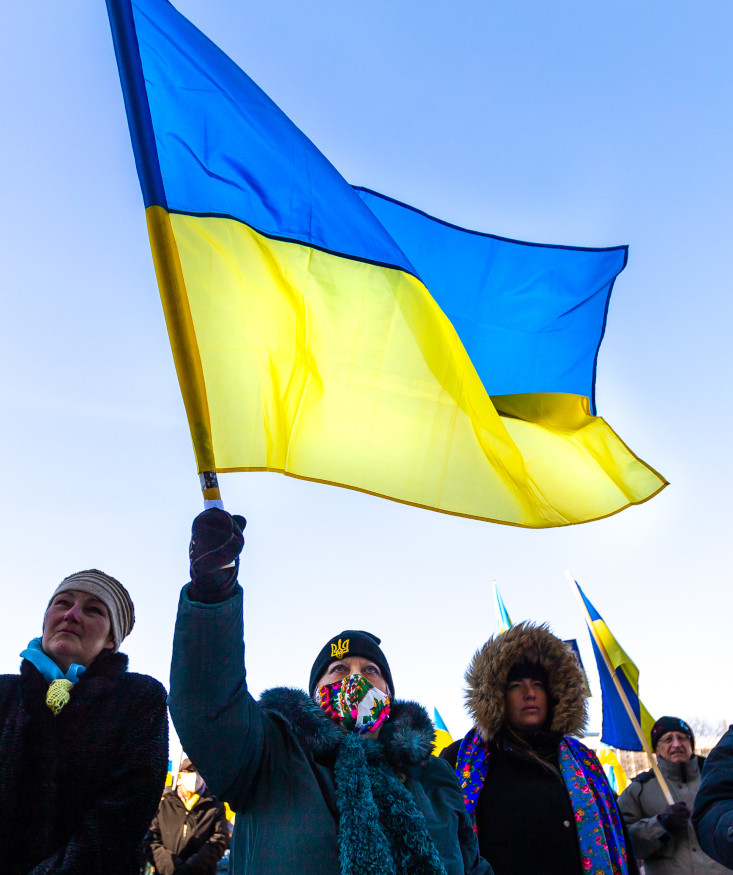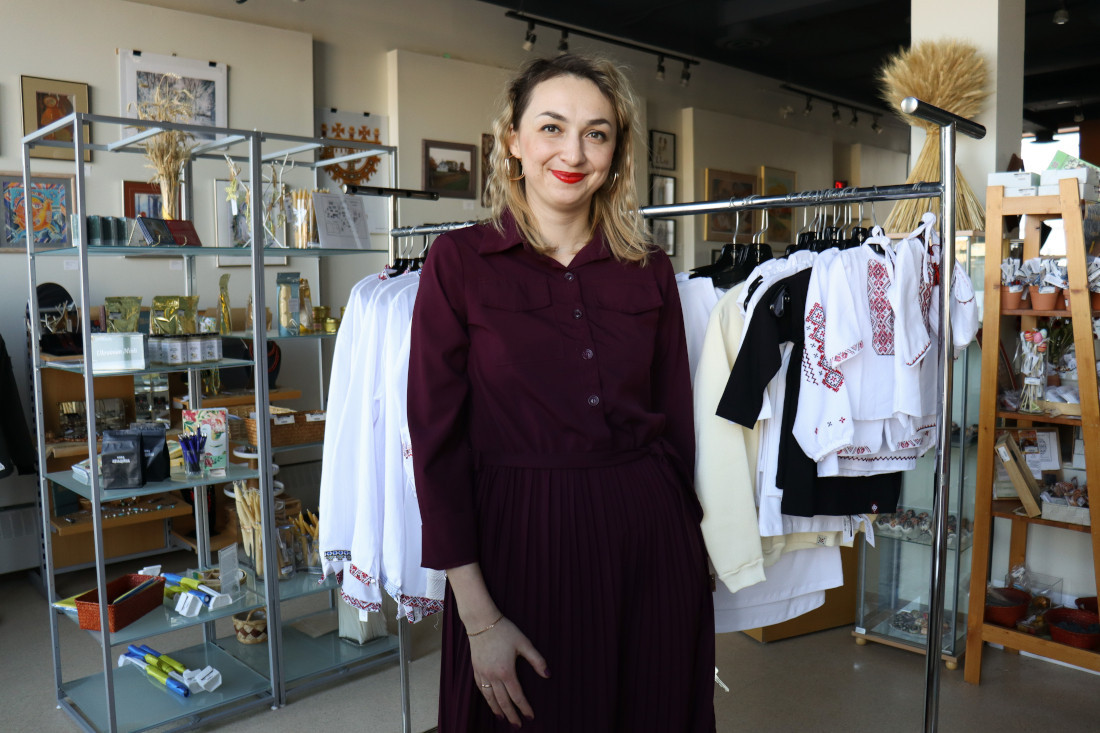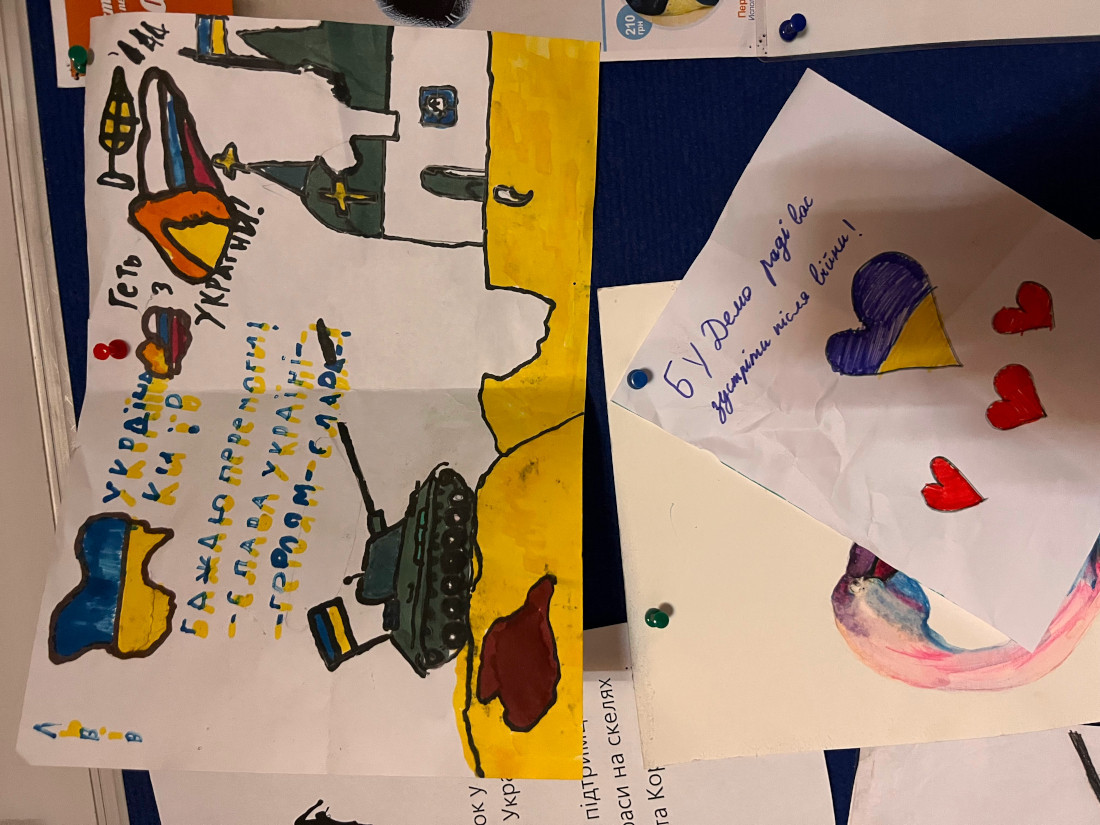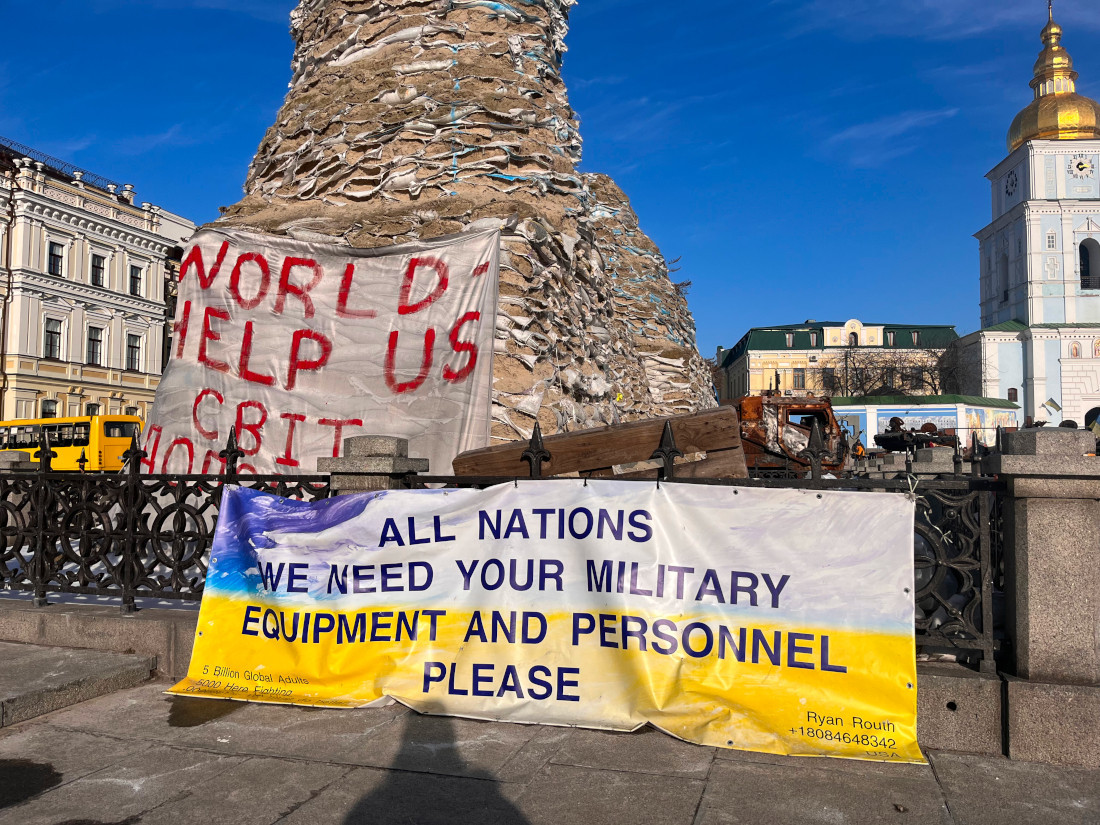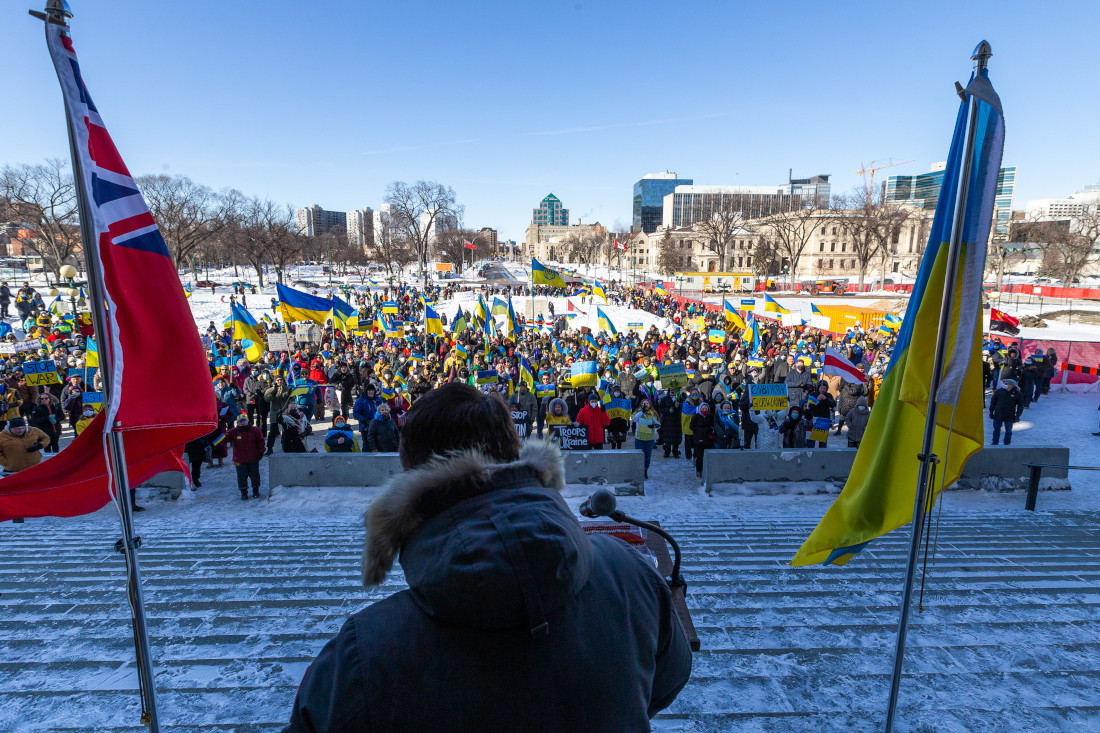Standing with Ukrainians
A story of refuge, hope and the need for funding
Svitlana Poliezhaieva comforted her two children while hiding in the basement. She could hear the bombs dropping on a block of houses a couple kilometres from her home in Kyiv, Ukraine.
“You don’t want to believe that something bad is going to happen in the place where everything is so great for you,” she says.
To protect her family, Poliezhaieva fled to Western Ukraine where she stayed with people hosting displaced individuals. She says she is grateful for their hospitality and how her family was treated like relatives.
At one point during her stay, the host family cooked borscht, which is a traditional Ukrainian soup made with beets and served with sour cream.
On March 1, 2022, she heard Russian soldiers were torturing children, so she decided to flee the country. A volunteer in Moldova provided her with information on crossing the Ukrainian border and helped her buy plane tickets to Germany, where she would stay with her sister for five months.
“It was an instinct to survive,” Poliezhaieva says.
She shares her story as one of the 15,500 Ukrainian newcomers who have arrived in Manitoba since Russia’s full-scale invasion began on Feb. 24, 2022.
As the one-year mark for the war approaches, Manitoba has welcomed roughly 12 per cent of Ukrainian refugees in Canada – the highest number of any province on a per-capita basis, as stated in a provincial news release.
According to the United Nations, “more than 7.5 million people have fled Ukraine, and nearly 7 million Ukrainians are internally displaced.” This is the biggest European conflict-induced displacement since the Second World War.
Historical context behind the war
The current tension between Russia and Ukraine dates back to the collapse of the Soviet Union in 1991, which led to Ukraine’s independence and transition to a market economy.
In 2014, conflict between the two countries continued after former Ukrainian president Viktor Yanukovych was overthrown by Ukrainian protestors. After Ukrainians overwhelmingly voted in favour of increasing the country’s trade relationship with the European Union and a shift away from Russian hegemony, the pro-Russian Yanukovych vetoed the deal, leading to his ouster.
The new interim government signed an agreement with the European Union, allowing Ukraine to join the economic trade bloc, which consists of policies on product regulation and the free movement of goods and services.
Russia took over Crimea and positioned military personnel along the peninsula to threaten Ukraine until they made a series of cease-fire agreements in 2015, known as the Minsk agreements.
In April 2019, President Volodymyr Zelenskyy became the new leader of Ukraine and began strengthening its ties with the United States and other NATO allies. Russia’s President Vladimir Putin seemingly feared losing further access and control of Ukraine, which led to the full militarized attack in February 2022.
Life and community in Manitoba
As of Feb. 5, 2023, the United Nations Office of the High Commissioner for Human Rights (OHCHR) had recorded 18,817 civilian casualties in Ukraine: 7,155 killed and 11,662 injured. OHCHR says the number of civilian casualties is likely higher due to delays in reporting and accuracy. “
When the war started, everything changed,” Poliezhaieva says, as her voice cracks. “But I am not afraid of anything.”
Poliezhaieva and her family originally planned to move to Canada in 2018 after her husband received a job offer, but they decided to stay in Kyiv. When the bombs were going off, she couldn’t help but wonder what her family’s life would have been like had they moved earlier.
Her family arrived in Winnipeg on Aug. 5, 2022. They chose Manitoba because of the province’s affordable prices for accommodation, their employment offer and how accessible it was to fill out government forms for identification, healthcare and driver’s licenses.
Poliezhaieva works as the executive assistant at Oseredok Ukrainian Cultural and Educational Centre, which is a museum and archival heritage institution highlighting ethnology, folk art, fine art and archives related to Ukrainian community history.
She manages the centre’s boutique, organizes fundraising events and coordinates the English-language classes and speaking club.
She says 36 newcomers are enrolled in the English-language classes, with 320 people on the waitlist. These classes take place from Monday to Friday from 9:30 a.m. to 12:30 p.m.
While the classes are free of charge, the centre needs funds to cover the cost of learning materials and the teacher’s salary.
Staff at Oseredok plan to expand the program by renovating the basement into an English-language school, increasing the building capacity and the number of students able to participate. The proceeds from their event fundraisers go toward this project.
“They need to adjust to the new community and integrate as fast as possible,” Poliezhaieva says. “If we teach English to newcomers, they can do everything themselves.”
In addition, the speaking club hosts 30 participants and takes place every Saturday from 2 to 3:30 p.m. It gives Ukrainians a chance to practise their English-language skills.
Proposal for Ukrainian Humanitarian Fund
Roman Yereniuk, former acting director of the Centre for Ukrainian Canadian Studies at the University of Manitoba, says the Ukrainian Canadian Congress (UCC) also needs funding to help newcomers settle in Manitoba and support people in Ukraine.
The Ukrainian community is one of the largest ethnic populations in Canada with nearly 1.4 million people. The UCC advocates for the needs of the community and represents national, provincial and local Ukrainian-Canadian organizations. After spending close to $300,000 on new children’s and adult mattresses, UCC ran out of funding, he says. Since November 2022, Ukrainian refugee families have been purchasing their own mattresses, which has added to their list of expenses.
Yereniuk says many people in Winnipeg have donated items to families. However, there are more refugees expected to arrive in the province, and funding and donations are still needed.
“We’ve sort of exhausted the community now. So where are you going to get those tables for four or tables for six?” he says.
At a city council meeting on Thursday, Jan. 26, Coun. Russ Wyatt proposed the idea of a Ukrainian Humanitarian Fund in partnership with the City of Winnipeg. The fund would provide aid to people impacted by the war in Ukraine and resources for resettlement in Manitoba.
“We believe there is a role that can be played by the City to help and assist in the fundraising for Ukraine,” Yereniuk said at the meeting.
The proposed Ukrainian Humanitarian Fund would provide non-military equipment and aid to soldiers, ambulance drivers, firefighters and healthcare workers in Ukraine.
Yereniuk says UCC would collaborate with the City to form a budget and discuss how community members and the municipal government would contribute match donations for the fund.
“We notice that there is tremendous destruction taking place in many cities,” Yereniuk says. “People are on the run.”
Mayor Scott Gillingham motioned to refer the item to the Executive Policy Committee.
“The conversation will not end in any way,” he says.
If the motion passes, Winnipeg would be the first city to establish a humanitarian fund specifically for Ukraine.
“It’ll be a model for other Canadian cities, and it’ll be a model for cities around the world,” Yereniuk says. “Sometimes it’s nice to see all levels of government participate in trying to put down an evil that has been created in that society.”
The provincial government has donated $800,000 in direct humanitarian aid to Ukraine and nearly 300 soft body-armour vests for soldiers.
Manitoba has also established a Ukrainian Refugee Task Force, led by the Manitoba Emergency Measures Organization. The task force provides assistance for settlement services, including housing, employment search, healthcare, education, childcare and other social supports.
The Reception Centre and Settlement Services Hub at the Best Western Hotel on Wellington Avenue is the dedicated welcoming centre for new arrivals.
Ukrainian refugees receive a welcome package that includes a list of resources and access to temporary accommodations and meals for up to 30 days. They receive a brief orientation and referral services through Manitoba Start, an organization connecting newcomers with settlement resources.
According to a report, there are approximately 100 ethnocultural groups in the city, author Jill Bucklaschuk, academic research director for the Community Engaged Research on Immigration Network (CERI Network) at the University of Winnipeg, says.
Globally, countries need humanitarian aid. Yereniuk says Canadians who support multiculturalism have a responsibility to support those countries.
“This would go a long way to alleviate some of the problems,” he says.
Staff at Oseredok created a guide for people who want to support Ukrainians and take local action.
They suggest writing to members of Parliament – applying pressure for further assistance, raising awareness to address the needs within the Ukrainian community, supporting Ukrainian businesses and challenging Russian disinformation.
Poliezhaieva says more funds could be donated toward English-language classes in Winnipeg and war efforts in Ukraine.
“We need to stop the war as fast as possible,” she says.
To donate to Oseredok’s programming and cultural exhibitions and resource collections, visit oseredok.ca/donate. To donate to the Ukrainian Canadian Congress visit ucc.ca/support-us/donate-now.
Published in Volume 77, Number 19 of The Uniter (February 16, 2023)

